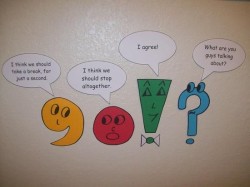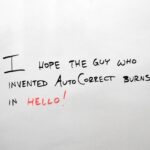
September 24th is National Punctuation Day. It seems right that we should pay homage to punctuation in this blog post……
How? Well, I will briefly go through the common punctuation marks and when to use them….and then the best part will be at the end. Here goes:
Period: (.) Use at the end of a sentence. Also use in some abbreviations. Not generally used in acronyms that are capitalized such as IBM, AARP, etc. Used for the abbreviation for inch (in.), so it doesn’t get confused with the word in.
Comma (,) Oh, do we have to? There are so many rules! Here are the important ones:
1. Use a comma to separate the two complete sentences that make up a compound sentence.
- I am doing the laundry, and I am cleaning the bathrooms.
2. Use a comma to separate items in a series whether they are words, phrases, or clauses.
- I like peppers, onions, and mushrooms on my pizza.
- I like to ride horses, play volleyball, and knit blankets.
3. Use a comma after introductory words, phrases, or clauses.
- Finally, we are going to Paris.
- After the movie, we are going to dinner.
- Whenever we go to dinner, we eat dessert.
4. Use a comma to set off interrupters in a sentence.
- I know, however, that he isn’t home.
- The world, in my opinion, is flat.
- The watch, which I got on sale, is very valuable.
5. Use a comma with quotations.
- He said, “I am not hungry yet.”
- “I am not hungry yet,” he said. TIP: Commas always go inside quotation marks in American English. Periods do too, by the way.
6. Use a comma with direct address.
- Mary, clean your room.
- Clean your room, Mary.
- No, Mary, he isn’t here yet.
7. Use a comma with dates and addresses (sometimes).
- I was born on September 8, 1980, in Lincoln, Nebraska, on a Friday afternoon.
- I was born in September 1980 in Nebraska on a Friday afternoon.
- He lives at 45 Main St., Boston, MA 01932
8. Use a comma with contrasting elements.
- She was tall, yet graceful.
- It was a warm day, but very rainy.
9. Use a comma when not using one would cause confusion.
- While we were eating, ants arrived on our blanket.
- The two dresses were blue and white, and green and gray.
Semicolon (;) Use a semicolon to separate two sentences that are closely related when you do not want to make two separate sentences or use a conjunction and comma. (Semicolons always goes outside quotations marks.)
- I went to college in Boston; my brother went to school on the West Coast.
Also use a semicolon (or rewrite) to clear up a series that already has commas.
- The committee included Jane Green, the major; Jim Cotton; Helen Cleary; the comptroller; and four other employees.
Colon (:) Use a colon to introduce a list whether it is horizontal or vertical. (Colons are also used in digital time). Colons can also be used to introduce other things, such as quotes, but not in dialogue. (Colons always go outside quotation marks.)
- Please buy these ingredients: chcolate, flour, sugar, and milk.
- In his speech the major talked about the new mall: “I think the economy of our city will be greatly enhanced by the 101 additional businesses in the new mall.”
Question Mark (?) Use a question mark after a question. Question marks can go inside or outside quotes, depending on the sentence.
- He asked, “Are we there yet?” (Quote is a question.)
- Did he say , “I recognize you”? (Whole sentence is a question.)
- Did he ask, “Are we there yet?” (Both sentence and quote are questions.)
Exclamation Point (!) Use when expressing emotion. Please don’t use more than one at a time. Please (!). With quotes, follow the same guidelines as with question marks.
Hyphen (-) Use a hyphen in compound words (sometimes). Consult a dictionary if you are unsure if a word has a hyphen; if you can’t decide (or dictionaries disagree), just be consistent! Hyphens also split words on the syllable at the end of a line—mostly before computers. (There are no spaces around hyphens.)
Dash (—) A short dash (en dash, longer than a hyphen) is used in number ranges and as the minus sign. The long dash (em dash) is used to indicate a big break in thought. Please don’t overuse long dashes. They have no real place in formal writing. (There are no spaces around dashes.)
- My dog—he isn’t trained yet—is in a crate all night. (You can also use parentheses, but don’t use commas. You might be trying to connect two complete sentences with a comma—a definite NO-NO.)
Parentheses ( ) Use parentheses to enclose additional information. If the content of the parentheses is a complete sentence, punctuate it as such.
- Turn to Chapter 5 (page 66).
- Turn to Chapter 5. (This chapter is the most challenging one in the book.)
Brackets [ ] Use brackets if you need parentheses inside of parentheses. Also use brackets to explain part of a quote that may not be understood because it was taken out of context.
- The President said, “It [the war] will cost us over 6 billion dollars.
Quotation Marks (“) Use to enclose the exact words someone says. Also use to enclose short stories, poems, song titles, articles, chapter titles, and other parts of larger things. Use italics for books, movies, CDs, magazine titles, and other larger things.
Single Quotations (‘) Use single quotes only for quotes inside of quotes. Do not use them for emphasis! Use italics, or sometimes double quotes, for emphasis.
Apostrophes (‘) Use apostrophes to indicate possession. Use apostrophes to form contractions. TIP: Don’t use apostrophes in plurals (please) unless not doing so would cause confusion.
- A‘s, 1990s, ’90s (all correct).
Ellipsis ( . . . ) Use to indicate missing words in a sentence or a trailing off at the end of the sentence. Often used in dialogue. Use three periods with spaces between each, and if you use an ellipsis at the end of the sentence, use four periods.
OK. Now for the fun. I told you to wait until the end. Here are some links to more unusual punctuation marks, for example, the interrobang!
Happy Punctuation Day!
P.S. If you are new to the blog, please look at the other Grammar Diva blog posts!



Thanks, Arlene. This is the most concise, easy to understand explanation of basic punctuation. I have printed it out to keep by my computer.
Love your blog!
Debbie
Thank you! So nice of you to say 🙂
You said: While eating, ants arrived on our blanket.
What were they eating? Misplaced modifier?
Oh, gosh, I corrected a mistake with a worse mistake. Let me try that again!
While we were eating, ants crawled all over our blanket.